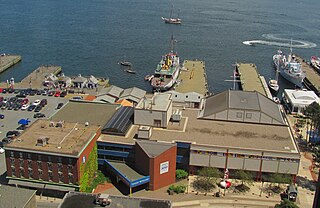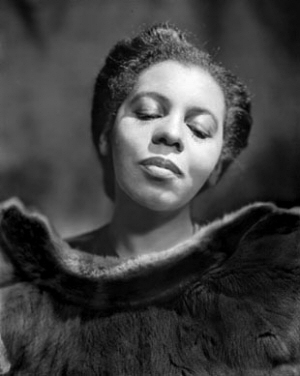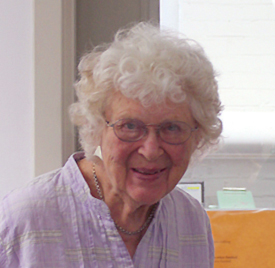Related Research Articles

The Maritime Museum of the Atlantic is a maritime museum located in downtown Halifax, Nova Scotia, Canada.

Portia May White was a Canadian contralto, known for becoming the first Black Canadian concert singer to achieve international fame. Growing up as part of her father's church choir in Halifax, Nova Scotia, White competed in local singing competitions as a teenager and later trained at the Halifax Conservatory of Music. In 1941 and 1944, she made her national and international debuts as a singer, receiving critical acclaim for her performances of both classical European music and African-American spirituals. White later completed tours throughout Europe, the Caribbean, and Central and South America.

NSCAD University is a public art university in Halifax, Nova Scotia, Canada. The university is a co-educational institution that offers bachelor's and master's degrees. The university also provides continuing education services through its School of Extended Studies.
William Edward deGarthe (1907–1983) was a Finnish-born painter and sculptor who lived for much of his life in Peggy's Cove, Nova Scotia.
Yvonne Atwell is a Canadian community activist, former provincial politician and former hospital administrator. She is known for being the first Black woman elected to the Nova Scotia House of Assembly.

Studio pottery is pottery made by professional and amateur artists or artisans working alone or in small groups, making unique items or short runs. Typically, all stages of manufacture are carried out by the artists themselves. Studio pottery includes functional wares such as tableware and cookware, and non-functional wares such as sculpture, with vases and bowls covering the middle ground, often being used only for display. Studio potters can be referred to as ceramic artists, ceramists, ceramicists or as an artist who uses clay as a medium.

Edith Agnes Smith was a Canadian painter and teacher. She was one of the original members of the Maritime Art Association and served as President of the Nova Scotia Museum of Fine Arts.
Ursula Johnson is a multidisciplinary Mi’kmaq artist based in Halifax, Nova Scotia, Canada. Her work combines the Mi’kmaq tradition of basket weaving with sculpture, installation, and performance art. In all its manifestations her work operates as didactic intervention, seeking to both confront and educate her viewers about issues of identity, colonial history, tradition, and cultural practice. In 2017 she won the Sobey Art Award.
Toshiko MacAdam is a Japanese textile artist based in Bridgetown, Nova Scotia, Canada. She is best known for her work with large-scale textile structures, especially "textile playgrounds" for children, brightly colored net-like structures of crocheted and knotted nylon.

Lois Etherington Betteridge was a Canadian silversmith, goldsmith, designer and educator, and a major figure in the Canadian studio craft movement. Betteridge entered Canadian silversmithing in the 1950s, at a time when the field was dominated by male artists and designers, many of them emigrés from the United States, the United Kingdom, and Europe. In fact, Betteridge was the first Canadian silversmith to attain international stature in the post-war studio craft movement.

Alice Mary Hagen was a Canadian ceramic artist from Halifax, Nova Scotia. She was trained in china painting, and earned her living through selling painted chinaware and teaching. She was among the artists selected to paint plates for the 1897 Canadian Historical Dinner Service. She gained a high reputation for the quality of her work, for which she won various prizes. She married happily and had two daughters. She continued to paint china while raising her family in Canada and Jamaica. When she was about sixty and her husband had retired she learned to make pottery at her studio in Nova Scotia, and was a pioneer of studio pottery in the area. She continued to produce and sell painted pottery until she was aged 93. Many ceramic artists acknowledged their debt to Alice Hagen as a teacher and an example.

Laurie Swim is a Canadian visual artist, best known for her quilt art. Her work can be found in the permanent collections of the New York Museum of Arts and Design, the Nova Scotia Art Bank, the Nova Scotia Designer Crafts Council, the Ontario Workers Arts and Heritage Centre, and in private collections. She won the Portia White Prize in 2013.

Elizabeth Styring Nutt, was an artist and educator, known for her leadership of the Nova Scotia College of Art in Halifax.
Ruth Salter Wainwright (1902–1984), was a Canadian painter known for her pioneering of the Maritime Modernist movement.
Mary Marguerite Porter Zwicker was a Canadian artist and art promoter from Halifax, Nova Scotia. Known for her watercolor paintings of landscapes and villages in Nova Scotia, Zwicker exhibited her work at the Royal Canadian Academy of Arts, the Montreal Art Association, and the Art Gallery of Nova Scotia. Together with her husband, Leroy Zwicker, she owned and operated Zwicker's Gallery; for most of the 20th century, Zwicker's Gallery was the only Halifax gallery that routinely held art exhibits open to the public. It still operates.
Lucie Chan is a visual artist born in Guyana, who is now based in Canada. Her artwork employs various techniques including large scale drawings and installation to examine issues of identity and race.
Marion Bond (1903-1969) was a Canadian painter. A graduate from Columbia University, she taught at the Nova Scotia College of Art.

Maria Morris Miller (1813–1875) was a Canadian artist from Halifax, Nova Scotia who is known for her botanical paintings and illustrations. She presented her work to Queen Victoria and received royal patronage for life. She is also the first professional woman artist in Nova Scotia, recognized in her field during her active career years. She worked with scientists and government officials, garnering her accolades as the "Audubon of Nova Scotian field flowers".
Edith Hester McDonald-Brown was an African-Canadian artist. She is thought to be the first documented Black female painter in Canadian art history.
Charlotte Lindgren is a Canadian sculptor-weaver, installation artist, photographer and curator. Lindgren gained worldwide fame for innovative weaving due to the response to her distinctive installation Aedicule in the 1967 International Biennial of Tapestry in Lausanne, Switzerland. Her architectural textile works — usually large in scale — are single woven planes that transform into three-dimensional forms. They explore the interplay between positive and negative spaces, allowing for dramatic shadows and movement. Lindgren has represented Canada abroad many times, and in 2002 was awarded the Queen Elizabeth II's Golden Jubilee Medal. She lived in Winnipeg from 1956 to 1963, then in 1964 moved to Halifax. She lives today in Nova Scotia.
References
- 1 2 3 "DEAR-HESSON, Audrey". Canadian Women Artists History Initiative. Retrieved 26 March 2018.
- 1 2 3 "A trailblazer for African Nova Scotia Art speaks". The Chronicle Herald. 14 April 2014. Archived from the original on 26 March 2018. Retrieved 26 March 2018.
- 1 2 Elissa Barnard (31 January 2013). "Hesson shattered racial barriers as NSCAD grad". The Chronicle Herald. Archived from the original on 26 March 2018. Retrieved 26 March 2018.
- 1 2 Chris Shapones (19 April 2017). "In This Place: The lasting impact of Nova Scotia's first exhibition of Black artists' work". Visual Arts News. Retrieved 26 March 2018.
- ↑ Gerges, Merray. Major Feature. beckaviau